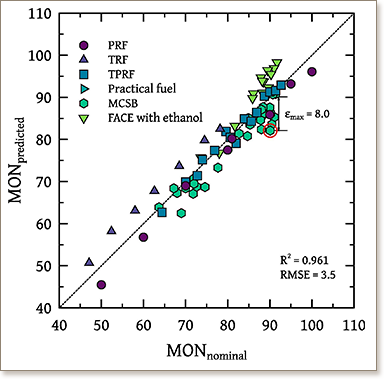Ignition delay time sensitivity in ignition quality tester (IQT) and its relation to octane sensitivity


Cetane number (CN) is a commonly used metric to rate the ignition quality of distillate fuels. In this work, a concept of sensitivity in ignition delay time (IDT) obtained with an ignition quality tester (IQT) is proposed, which is correlated to octane sensitivity (OS), i.e., the difference between research octane number (RON) and motor octane number (MON). The concept is based on the determination of IDT using the ASTM D6890 standard and IDT obtained at a temperature lower than that prescribed by the standard. The IDT measured at this lower temperature is referred to as IDT1, which is obtained via a calibration procedure similar to the ASTM D6890 standard, but with a higher value of reference IDT for calibration with n-heptane. The IDTh (measured at the derived cetane number (DCN) ASTM D6890 condition) of a given test fuel and a binary primary reference fuel (PRF) mixture of iso-octane and n-heptane was measured to identify a PRF with matching IDTh as the test fuel. The ratio of low temperature IDTs of the non-PRF test fuel and PRF, i.e., IDT1,non-PRF/IDT1,PRF was defined as IDT sensitivity (IDS), which was correlated with the OS of the test fuel. The RON and MON values of a wide range of fuel classes including surrogate fuels and fully blended practical fuels were estimated, and showed satisfactory agreement with measured RON/MON values. The RON values of many pure components that could not be measured with the standard test method ASTM D2699 were also estimated. Two certification diesels and Saudi Arabian pump grade diesel were also tested.
DOI: 10.1016/j.fuel.2018.05.131

"KAUST shall be a beacon for peace, hope and reconciliation, and shall serve the people of the Kingdom and the world."
King Abdullah bin Abdulaziz Al Saud, 1924 – 2015
Thuwal 23955-6900, Kingdom of Saudi Arabia
© King Abdullah University of Science and Technology. All rights reserved